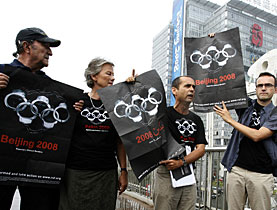Protests disrupt Olympic flame ceremony

The flame-lighting ceremony for the Beijing Olympic Games has been interrupted by pro-Tibet protestors.
Despite such disruptions, which come in the wake of China’s violent crackdown in Tibet, a Swiss former United Nations special rapporteur believes a boycott of the Games is not the solution.
On Monday three men evaded massive security and ran onto the field of the stadium in Greece’s Ancient Olympia during the flame-lighting ceremony.
The three, all from Paris-based group Reporters Without Borders, were detained after their protest, which occurred as Liu Qi, president of the Beijing Olympics organising committee and Beijing Communist Party Secretary, was giving a speech.
One protester held a banner showing the Olympic rings as handcuffs.
“If the Olympic flame is sacred, human rights are even more so,” the French group said in a statement. “We cannot let the Chinese government seize the Olympic flame, a symbol of peace, without denouncing the dramatic situation of human rights in the country.”
Moments later a Tibetan woman covered herself in red paint and lay in the road in front of a runner carrying the Olympic torch into the village of Ancient Olympia, while other protesters chanted “Free Tibet” and “Shame on China”.
Jacques Rogge, president of the Lausanne-based International Olympic Committee (IOC), attended the ceremony.
“It’s always sad when there are protests. But they were not violent and I think that’s the important thing,” Rogge told The Associated Press.
When the stadium incident took place, China state television cut away to a pre-recorded scene.
“Silent diplomacy”
Rogge reiterated on Monday his long-standing position that the IOC was not a political organisation and could not interfere in the internal affairs of China.
He stressed however that he was involved in “silent diplomacy” with Chinese leaders on Tibet and other human rights issues and would meet Chinese Premier Wen Jiabao in April.
“I repeat, we are not a political body, we are not a non-governmental organisation, but it is our responsibility to make sure the athletes get the best possible games which they deserve,” he said.
Rogge contested claims that the human rights situation in China had deteriorated since the IOC gave the games to Beijing in 2001.
“I dispute that, I challenge that,” he said. “Awarding the games to China has put China in the limelight and opened the [human rights] issues up to the world. Tibet, rightfully so, is on the front page. But it would not be on the front page if the games were not being organised in China.”
He added: “I believe the games have advanced the agenda of human rights.”
Violence
The recent violence in Tibet has brought China’s policies to the fore in the final months before the games.
Protests began on March 10 on the 49th anniversary of a failed uprising against Chinese rule and turned violent four days later, touching off demonstrations among Tibetans in three neighbouring provinces.
Beijing’s official death toll from the rioting is 22, but the Dalai Lama’s government-in-exile has said 99 Tibetans have been killed.
Rogge expressed concern about the violence but would not criticise China for its crackdown.
“It’s difficult to make a judgment on the responsibilities, but violence from whatever side is something which of course is worrying us,” he said.
Boycott
Many NGOs, including Reporters Without Borders, have called for a boycott of the Beijing Olympics. But according to Adolf Ogi, a former United Nations special rapporteur, a boycott would primarily punish the athletes.
Ogi told Swiss radio at the weekend that he instead wanted to see the IOC addressing the problems of which the Chinese must be made explicitly aware.
“Now is not the time for giving explanations, but for acting,” he said.
On Monday Germany rejected calls for a boycott of the Beijing Olympics and pledged to send a team to the games.
The German Olympic Sports Union noted that the United Nations, the German government and the Dalai Lama had spoken out against a boycott of the Beijing Olympics.
swissinfo with agencies
The Lausanne-based International Olympic Committee awarded the 2008 Olympic Games to Beijing on July 13, 2001. While the people of the city celebrated in the streets, many human rights organisations, dissidents and Tibetan exiles criticised the decision.
Reactions included “historic wrong decision” and “reward for a corrupt regime”. There was even a parallel drawn with the Olympic Games of 1936 which were misused for Nazi propaganda.
Others insisted that the Games offered an opportunity for democracy in China. The IOC was concerned not to put the focus on the human rights issue in choosing the venue for the 2008 Olympics.
The 2008 Olympic Games take place in Beijing from August 8-24. It is the first time they are being held in the People’s Republic.
There are 302 competitions in 28 sports.
The opening ceremony begins at 8.08pm on 08.08.2008.
Swiss star architects Herzog & de Meuron designed the Olympic stadium in Beijing.
A workforce of about 30,000 is building the Olympic facilities.
From Olympia, the flame started on March 24 its 137,000-kilometre journey across five continents, ending at the Beijing stadium on August 8.
High priestess Maria Nafpliotou handed the torch to Alexandros Nikolaidis, who won a silver medal in taekwondo at the 2004 Athens Games. He was to hand the flame to Luo Xuejuan, who won China’s only swimming gold in Athens.
A total of 645 torchbearers will carry the flame through Greece for a week, over 1,528 kilometres. It will briefly stop at the Acropolis before being handed over to Chinese officials at the restored ancient stadium where the first modern Olympics were held in 1896.

In compliance with the JTI standards
More: SWI swissinfo.ch certified by the Journalism Trust Initiative











You can find an overview of ongoing debates with our journalists here . Please join us!
If you want to start a conversation about a topic raised in this article or want to report factual errors, email us at english@swissinfo.ch.